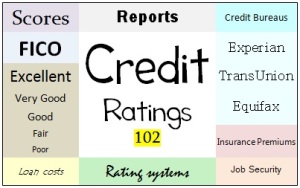Cut through the misinformation about credit ratings
Q: What’s the difference between a credit report and a credit score?
A: A credit report contains information that creditors provide to a credit bureau; it details how you have handled your past and current financial obligations. A credit bureau collects data from creditors 24/7, but does not check the accuracy of the information provided by those creditors. There is a cost for creditors to subscribe to a credit bureau service. It is a voluntary system, and creditors are not required to provide this data to a credit bureau. Some creditors report information monthly, some periodically, and some do not report at all. There are three main credit bureaus that provide credit reports: Experian, Transunion and Equifax.
A credit score is different from a credit report. Although the three major credit bureaus do provide credit scores based on the credit information they have for you, the credit score is not part of the credit report. 90 of the top 100 largest financial institutions use your FICO score to determine your credit risk and to decide whether or not to give you a loan or to extend credit. This credit score is actually a calculation developed by the Fair Isaac Company (named for its founders, Mr. Isaac and Mr. Fair), so it is called the “FICO” score. The FICO score predicts future credit risk. It does not reflect your credit history. The FICO score range is 300 to 850. If your FICO score is very high, you are considered a good credit risk, and a lender is more likely to lend you money or extend credit at more favorable rates and terms.
Q: Many services and credit bureaus offer free credit scores. Are these always FICO scores?
A: No. Although all scores are generated from data collected by the three major credit bureaus, many scores are generated using different scoring models and not FICO’s. Also, the other scoring models may have different ranges. For example, some score ranges start at 330, while other ranges may end at 840.
Q: Why are my FICO scores different?
A: Though all three credit bureaus base their scores on the data they have on file, “FICO” scores may vary because: 1) creditors don’t always report to all three bureaus, 2) data collection methods and reporting can differ and 3) credit bureaus may install the latest versions of FICO software at different times.
Q: What is an “excellent” FICO score?
A: Before the 2007-2008 U.S. financial crisis, a FICO score in the range of 700 to 720 was considered to be excellent. Because of the large number of defaults during the crisis, creditors and lenders have become more cautious and currently look for scores as high as 740 to 760.
Q: How can I get my FICO score with my credit report, and do I need to get my scores from all three bureaus
A: You can get all your FICO scores by visiting MyFICO.com. You should request FICO scores from all three credit bureaus. Financial institutions may choose one of the three scores to make their credit decision. Some may choose two and others may choose all three scores.
Q: Is there any other way I get my credit report and FICO score?
A: When you apply for a loan or mortgage, the financial institution will pay to get your credit report and FICO score. They may share the information with you, if you ask.
Q: Where can I get more information?
A: Because information about credit reports and credit scores are constantly changing, a good source for updated information is myFICO.com.
Q: What does this have to do with financial planning?
A: Credit ratings affect loan costs, such as with the interest you are charged. If you can maintain a great credit score, or improve a not so good one, you can pay tens of thousands of dollars in less interest over your lifetime. Money that could be better used for other things, like building wealth in your investment portfolio. Also, having a bad credit rating could prevent you from being hired, or may be a factor in paying higher insurance premiums
Q: Do financial plans include credit rating information?
A: Holistic plans should include a place for your rating, an evaluation of it, and include plans for improving it. eFinPLAN financial plans do provide this information, and others do to.
This article was written by Richard S. Korn, a certified consumer credit counselor at the Westerville Area Resource Ministry (WARM).









